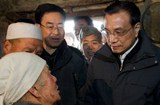International Disaster Relief and Humanitarian Aid
China's armed forces take an active part in international disaster relief and humanitarian aid operations organized by the government. They provide relief supplies and medical aid, dispatch specialized rescue teams to disaster-stricken countries, provide mine-sweeping assistance and carry out international exchanges of rescue and disaster reduction.
Since 2002 the PLA has undertaken 36 urgent international humanitarian aid missions, and transported relief materials worth more than RMB1.25 billion to 27 disaster-stricken countries. Since 2001, the Chinese International Search and Rescue (CISAR) Team, composed of officers and men from the engineering regiment of the Beijing Military Area Command, medical personnel from the PAPF General Hospital and experts from the China Earthquake Administration, has participated in eight international rescue operations. Since 2010, PLA medical assistance teams have been sent three times to Haiti and Pakistan to carry out international humanitarian medical rescue operations, and the helicopter rescue team of the army aviation has been sent to Pakistan to assist flood-relief operations there.
In March 2011 a devastating earthquake and tsunami hit Japan. The CISAR rushed to Japan and participated in the search-and-rescue operations. In July 2011 heavy floods battered Thailand. The PLAAF sent four aircraft to transport to Bangkok more than 90 tons of relief materials provided by China's Ministry of National Defense to the Thai armed forces. In September 2011, when disastrous floods struck Pakistan, the PLAAF dispatched five aircraft to deliver 7,000 tents to Karachi, and the Lanzhou Military Area Command sent a medical-care and epidemic-prevention team to Kunri, the worst-hit area.
China's armed forces actively provide medical care and aid to developing countries, and participate in international medical exchanges and cooperation, thus strengthening friendship and mutual trust with them. From 2010 to 2011, PLAN's hospital ship Peace Ark visited five countries in Asia and Africa and four countries in Latin America to provide "Harmonious Mission" humanitarian medical service. In 193 days the voyage covered 42,000 nautical miles, and nearly 50,000 people received medical services. In recent years, the PLA medical team has also provided medical service to local people in Gabon, Peru and Indonesia while participating in joint humanitarian medical drills.
The Chinese government attaches great importance to the solution of humanitarian problems caused by landmines. It actively supports and participates in international de-mining efforts. Since 1999, the PLA, in collaboration with relevant departments of the PRC government, has provided de-mining assistance to nearly 40 Asian, African and Latin American countries through offering training courses, sending experts to give on-site instruction, and donating de-mining equipment. As a result, the PLA has trained more than 400 mine-clearance personnel for foreign countries, guided the clearance of more than 200,000 square meters of land-mine areas and donated mine-clearance equipment worth RMB 60 million.
Safeguarding the Security of International SLOCs
To fulfill China's international obligations, the Chinese navy carries out regular escort missions in the Gulf of Aden and waters off Somalia. It conducts exchanges and cooperation with other escort forces to jointly safeguard the security of the international SLOCs. As of December 2012, Chinese navy task groups have provided protection for four WFP ships and 2,455 foreign ships, accounting for 49% of the total of escorted ships. They helped four foreign ships, recovered four ships released from captivity and saved 20 foreign ships from pursuit by pirates.
Chinese navy escort task forces have maintained smooth communication with other navies in the areas of joint escort, information sharing, coordination and liaison. They have conducted joint escorts with their Russian counterparts, carried out joint anti-piracy drills with naval ships of the ROK, Pakistan and the US, and coordinated with the European Union to protect WFP ships. It has exchanged boarding visits of commanders with task forces from the EU, NATO, the Combined Maritime Forces (CMF), the ROK, Japan and Singapore. It has exchanged officers for onboard observations with the navy of the Netherlands. China takes an active part in the conferences of the Contact Group on Piracy off the Coast of Somalia (CGPCS) and "Shared Awareness and Deconfliction" (SHADE) meetings on international merchant shipping protection.
Since January 2012, independent deployers such as China, India and Japan have strengthened their convoy coordination. They have adjusted their escort schedules on a quarterly basis, optimized available assets, and thereby enhanced escort efficiency. China, as the reference country for the first round of convoy coordination, submitted its escort timetable for the first quarter of 2012 in good time. India and Japan's escort task forces adjusted their convoy arrangements accordingly, thereby formulating a well-scheduled escort timetable. The ROK joined these efforts in the fourth quarter of 2012.
 |  |

 分享到人人
分享到人人 分享到QQ空间
分享到QQ空间














 回访和习近平握手渔民
回访和习近平握手渔民















